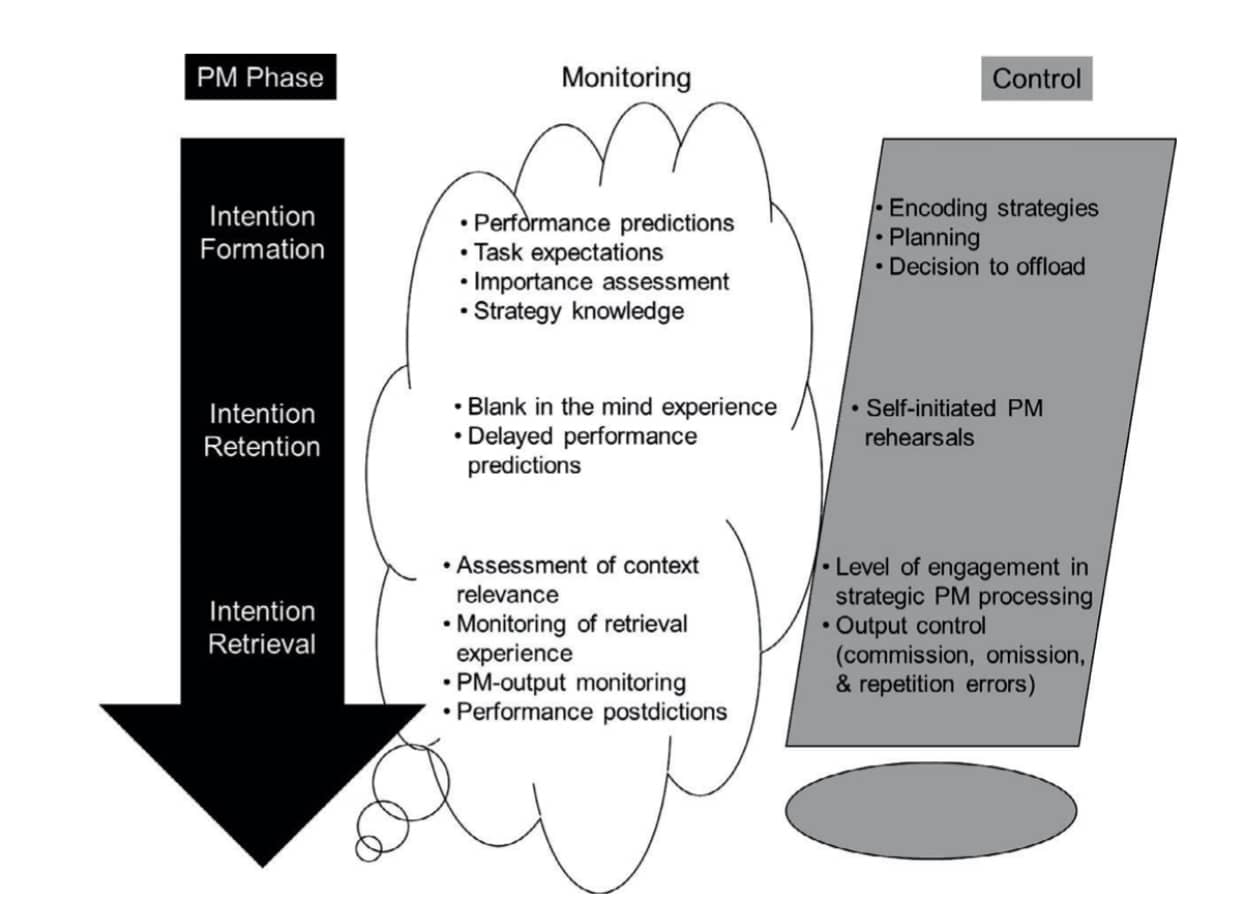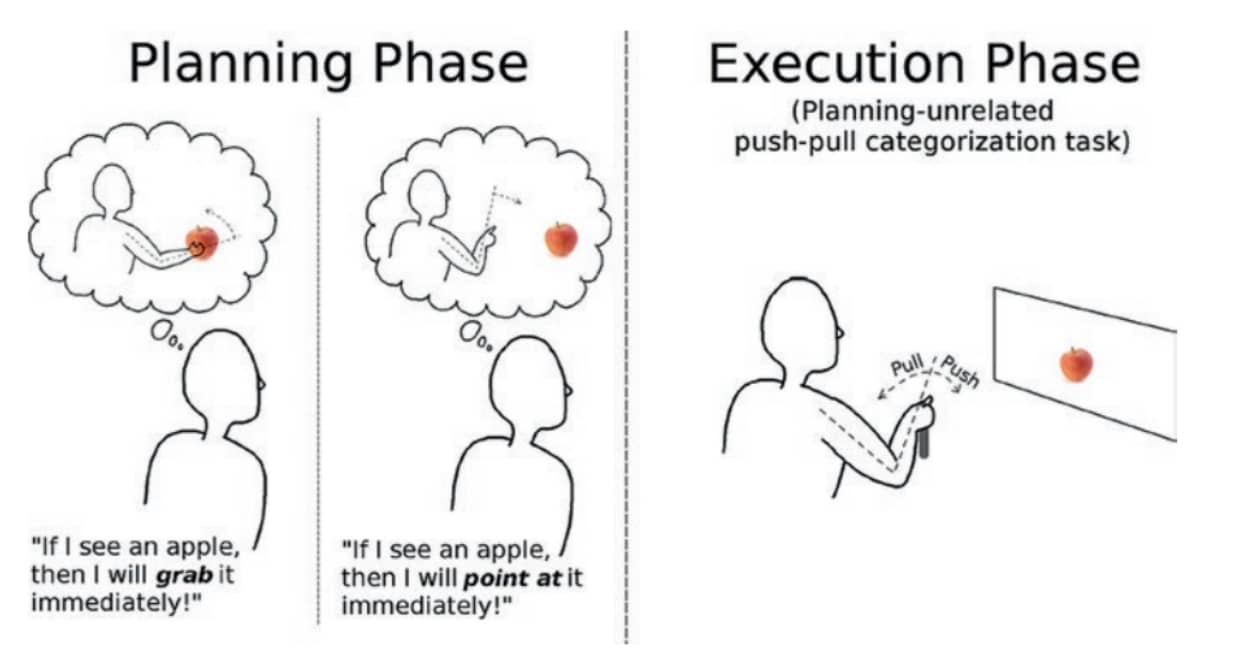Chuyển sang chế độ ngoại tuyến với ứng dụng Player FM !
What Is Prospective Memory? Everything You Need to Know
Series đã xóa ("Feed không hoạt động" status)
When?
This feed was archived on February 19, 2024 00:56 (
Why? Feed không hoạt động status. Server của chúng tôi không thể lấy được feed hoạt động của podcast trong một khoảng thời gian.
What now? You might be able to find a more up-to-date version using the search function. This series will no longer be checked for updates. If you believe this to be in error, please check if the publisher's feed link below is valid and contact support to request the feed be restored or if you have any other concerns about this.
Manage episode 292926047 series 1375140
 Prospective memory is fascinating. Your entire future relies on it working well.
Prospective memory is fascinating. Your entire future relies on it working well.
Why?
Well, let me ask you this:
How do you know that in the future you will remember to remember?
To test our ability to remember the need to remember in the future, researchers S. L. Penningroth and W.D. Scott asked a bunch of university students the following question:
“Imagine that your friend has asked you to make a call tomorrow morning to provide a personal recommendation for a full-time job. You must wait until morning to call because that is when the potential employer will be in the office.”
As Beatrice G. Kuhlmann discusses in the excellent book of essays, Prospective Memory, different students listed different strategies. To remind themselves of this future event, they might remember to make the call by:
- Mentally rehearsing the call
- Using an app for notification
- Leaving a note where they would be sure to see it
- Setting a specific time to make the call
These are all examples of metacognition that helps us remember future intentions. Without both intention and metacognition, we are all at risk of some serious prospective memory failure.
That’s why being able to remember to do things and perform actions in the future is so critical.
Let’s look more at this important type of memory and make sure you understand its importance, how to preserve it and even how to make it better. That way you can stop missing so many appointments and forgetting to do the things that matter.
https://www.youtube.com/watch?v=NXon2RZIJuc
What Is Prospective Memory?
Prospective memory is literally defined by remembering to do things in the future. This means that it is primarily linked to tasks.
- Attending a class
- Going to an appointment
- Completing a task at work on time
- Taking medication
- Remembering to pack a lunch
The Two Main Prospective Memory Tasks
There are at least two kinds of tasks that prospective memory influences:
- Time-based tasks
- Event-based tasks
Taking medicine at a particular time of day is a time-based task because it happens at a specific time. Another example would be baking. If you warm the oven for 10 minutes before putting the cookies inside, that task is time-based and your prospective memory operates in accordance. You can also explore these kinds of tasks in relation to procedural memory.
By contrast, event-based tasks involve some kind of cue in your environment.
If you see a grocery store on your way home, this might remind you that someone in your family asked you to pick up some apples or tea. In other words, this kind of prospective memory comes to mind when something you see, hear or feel cues you to think about the task.

Seeing a grocery store can trigger your memory that you need to do some shopping.
How Do Researchers Study Prospective Memory?
In order to analyze how people engage in prospective memory tasks, researchers create models. They do this by finding volunteers to participate in research studies that involve time-based or event-based tasks.
For example, S.J. Gilbert devised a study testing how people “offload” their future tasks. By creating a model of how people behave, he noticed an interesting difference in leaving reminders for yourself that you might recognize:
“I might write the details of an appointment on a piece of paper, which reminds me of where I need to go, but only after I have remembered that I need to go somewhere and consulted this record.”
In other words, making a note about an appointment in the future is no guarantee that you will remember to look at the note. You might even be confused by notes that you left for yourself. Thus, the implication of this study is that:
- We often need more than written reminders
- We need to be very clear about the written reminders we do leave for ourselves
What Does A Model Of Prospective Memory Look Like?
They’re pretty fascinating, actually!
A typical model of prospective memory shows that there’s a process that is divided into three categories:

A simple model of prospective memory showing three phases with several steps in each. From the book, Prospective Memory (Current Issues In Memory).
- Prospective memory, which involves:
- Intention formation
- Intention retention
- Intention retrieval
- Monitoring, which involves:
- Predictions, “Will I remember this?”
- Experiencing working memory blanks, “What was it I needed to do?”
- Assessing your memory for any reminders you might have left, “Didn’t I write the time down?”
- Control, which involves:
- Consciously using encoding strategies (like using a Memory Palace)
- Consciously reminding yourself about the task (rehearsal)
- Correcting for any errors (checking that an appointment was 4 p.m., not 4:30)
Does Prospective Memory Worsen With Age?
The answer depends on the nature of the experiment. Some have shown that older individuals do just as well as younger people. Others show that there can be issues, especially in cases where Alzheimer’s is present.
Here’s an example from Dr. Dawn McBride, take from “What is Prospective Memory?” In the following quote, McBride discusses a study that reveals the difference between younger and older individuals:
https://www.youtube.com/watch?v=pZj2ZnyJPqY
“In a study we conducted in my lab a few years ago, we compared prospective memory for older adults, people who are 55 or older, and younger adults, college students.
What we asked them to do was a common everyday task. We gave them a postcard and asked them to mail it back to us after a particular period of time had passed. In other words, a time-based task. Some subjects were asked to mail it the next day. Some, two days later. Some, five days later. All the way up to a month later.
We asked the subjects not to use any reminders. Like, not to put it up on their refrigerator to remind them, not to put it in their calendar, not to set an alarm, anything like that. Because we wanted to know how good their prospective memory was without any of these reminders.
We sent the subjects off, asked them to mail back the postcard without these reminders. And then we compared the performance for the older adults, those who are over 55, and the college-age students. And what we found is that, over time, the longer the period of time was before they were supposed to mail it back, the college students’ performance declined.

So if it was the next day, they did pretty well with the task. We got most postcards back on time. But if it was a month later, we got very few of the postcards back for the college students.
The older adults, however, did really well at this task. They in fact, almost all of them, sent the postcard back on time, even if it was a month later.
However, what we found is that, even though we asked them not to use external reminders, the older adults did in fact tend to use external reminders, based on a questionnaire that we sent to them after the study had ended. So in this particular study, we showed that older adults do actually perform prospective memory tasks very well, but they rely a lot on external reminders to do those prospective memory tasks.”
Note: In case you haven’t observed this point for yourself already, the older participants in the study either did not pay attention to the guidelines, or forgot to follow them.
Prospective Memory Examples
Pablo Picasso reportedly said, “What one does is what counts. Not what one had the intention of doing.”
This quote is important because examples of prospective memory are really examples of intentions people have for the future. The key difference is whether or not they successfully remembered to do what they intended.

Why is remembering what you intended to do important?
Simple:
The more goals you complete and the more problems you solve in life, the better your retrospective memory becomes. In other words, you enjoy going through your past so much more because you can be proud of all that you accomplished.
With that point in mind, here’s a list of examples from prospective memory psychology textbooks:
- Setting a New Year’s resolution
- Joining a pre-scheduled fitness program at the gym
- Buying a concert ticket and remembering to attend
- Taking out the trash in time for collection
- Paying a bill on time
- Pre-planning a reaction (if x happens, I will respond with y)
- Watering plants on a schedule
- Remembering a birthday or anniversary
- Return borrowed books to a library
- Follow safety procedures (pilots, ship’s captains, etc.)
- Remembering to write down your dreams or keep a journal
Can You Improve Your Prospective Memory?
Yes. And you do this by improving on what scientists call “implementation intentions.”
As Anna-Lisa Cohen and Jason L. Hicks point out in their book, Prospective Memory: Remembering to Remember, Remembering to Forget, “ implementation intentions can create habit-like behavior.”
They suggest that it is possible to create plans with an “if-this-then-that” structure broken into two phases:
- Planning phase
- Execution phase

The planning and execution phases of prospective memory. From the book, Prospective Memory: Remembering to Remember, Remembering to Forget.
Basically, you need to add clarity to what you’re doing to strengthen the link between perception and action. With enough focused attention and repetition, you will be able to practice the habit of being clearer in a way that promotes better prospective memory in the future.
We’ve already seen an example of this above:
Instead of writing cryptic notes to yourself, like “4.p.m.” you want to include as much information as you can: Specific names, dates, locations and the purpose of the reminder.
You can also memorize future events using a “Mnemonic Calendar.”
Memory expert Jim Samuel helps senior citizens remember to take medication by helping them turn their homes into a Memory Palace based on the days of the week.
For example, if you have to take a certain medication on Monday, this day of the week can be linked to your kitchen sink. If you imagine a giant moon in the sink and visualize it swallowing that pill, every time you enter the kitchen, you can think about this and it will help you remember:
- To check what day it is
- If it’s Monday, to take the medication
You can have these mental reminders all throughout your home. To learn more about this technique, check out:
Remember To Do Things: It’s Life Or Death
As you’ve seen, prospective memory is pretty clear once you get into the details. And it’s even across the board, even if you think you might have a different learning style.
Whether you’re an airline pilot or someone enjoying your retirement, you need to be able to remember future events.
All in all, being able to remember what to do and when to do it is what makes us human. And the quality of our lives really do come down to how we’re able to perform both consciously and subconsciously in the now – and in the near and distant future.
Obviously, science is not done studying this form of memory. But it’s pretty clear that intention is the key to improving it and there are some quick wins I’ve shared with you today.
So what do you say? Is your future looking brighter now that you know the ins-and-outs of this form of memory?
488 tập
Series đã xóa ("Feed không hoạt động" status)
When?
This feed was archived on February 19, 2024 00:56 (
Why? Feed không hoạt động status. Server của chúng tôi không thể lấy được feed hoạt động của podcast trong một khoảng thời gian.
What now? You might be able to find a more up-to-date version using the search function. This series will no longer be checked for updates. If you believe this to be in error, please check if the publisher's feed link below is valid and contact support to request the feed be restored or if you have any other concerns about this.
Manage episode 292926047 series 1375140
 Prospective memory is fascinating. Your entire future relies on it working well.
Prospective memory is fascinating. Your entire future relies on it working well.
Why?
Well, let me ask you this:
How do you know that in the future you will remember to remember?
To test our ability to remember the need to remember in the future, researchers S. L. Penningroth and W.D. Scott asked a bunch of university students the following question:
“Imagine that your friend has asked you to make a call tomorrow morning to provide a personal recommendation for a full-time job. You must wait until morning to call because that is when the potential employer will be in the office.”
As Beatrice G. Kuhlmann discusses in the excellent book of essays, Prospective Memory, different students listed different strategies. To remind themselves of this future event, they might remember to make the call by:
- Mentally rehearsing the call
- Using an app for notification
- Leaving a note where they would be sure to see it
- Setting a specific time to make the call
These are all examples of metacognition that helps us remember future intentions. Without both intention and metacognition, we are all at risk of some serious prospective memory failure.
That’s why being able to remember to do things and perform actions in the future is so critical.
Let’s look more at this important type of memory and make sure you understand its importance, how to preserve it and even how to make it better. That way you can stop missing so many appointments and forgetting to do the things that matter.
https://www.youtube.com/watch?v=NXon2RZIJuc
What Is Prospective Memory?
Prospective memory is literally defined by remembering to do things in the future. This means that it is primarily linked to tasks.
- Attending a class
- Going to an appointment
- Completing a task at work on time
- Taking medication
- Remembering to pack a lunch
The Two Main Prospective Memory Tasks
There are at least two kinds of tasks that prospective memory influences:
- Time-based tasks
- Event-based tasks
Taking medicine at a particular time of day is a time-based task because it happens at a specific time. Another example would be baking. If you warm the oven for 10 minutes before putting the cookies inside, that task is time-based and your prospective memory operates in accordance. You can also explore these kinds of tasks in relation to procedural memory.
By contrast, event-based tasks involve some kind of cue in your environment.
If you see a grocery store on your way home, this might remind you that someone in your family asked you to pick up some apples or tea. In other words, this kind of prospective memory comes to mind when something you see, hear or feel cues you to think about the task.

Seeing a grocery store can trigger your memory that you need to do some shopping.
How Do Researchers Study Prospective Memory?
In order to analyze how people engage in prospective memory tasks, researchers create models. They do this by finding volunteers to participate in research studies that involve time-based or event-based tasks.
For example, S.J. Gilbert devised a study testing how people “offload” their future tasks. By creating a model of how people behave, he noticed an interesting difference in leaving reminders for yourself that you might recognize:
“I might write the details of an appointment on a piece of paper, which reminds me of where I need to go, but only after I have remembered that I need to go somewhere and consulted this record.”
In other words, making a note about an appointment in the future is no guarantee that you will remember to look at the note. You might even be confused by notes that you left for yourself. Thus, the implication of this study is that:
- We often need more than written reminders
- We need to be very clear about the written reminders we do leave for ourselves
What Does A Model Of Prospective Memory Look Like?
They’re pretty fascinating, actually!
A typical model of prospective memory shows that there’s a process that is divided into three categories:

A simple model of prospective memory showing three phases with several steps in each. From the book, Prospective Memory (Current Issues In Memory).
- Prospective memory, which involves:
- Intention formation
- Intention retention
- Intention retrieval
- Monitoring, which involves:
- Predictions, “Will I remember this?”
- Experiencing working memory blanks, “What was it I needed to do?”
- Assessing your memory for any reminders you might have left, “Didn’t I write the time down?”
- Control, which involves:
- Consciously using encoding strategies (like using a Memory Palace)
- Consciously reminding yourself about the task (rehearsal)
- Correcting for any errors (checking that an appointment was 4 p.m., not 4:30)
Does Prospective Memory Worsen With Age?
The answer depends on the nature of the experiment. Some have shown that older individuals do just as well as younger people. Others show that there can be issues, especially in cases where Alzheimer’s is present.
Here’s an example from Dr. Dawn McBride, take from “What is Prospective Memory?” In the following quote, McBride discusses a study that reveals the difference between younger and older individuals:
https://www.youtube.com/watch?v=pZj2ZnyJPqY
“In a study we conducted in my lab a few years ago, we compared prospective memory for older adults, people who are 55 or older, and younger adults, college students.
What we asked them to do was a common everyday task. We gave them a postcard and asked them to mail it back to us after a particular period of time had passed. In other words, a time-based task. Some subjects were asked to mail it the next day. Some, two days later. Some, five days later. All the way up to a month later.
We asked the subjects not to use any reminders. Like, not to put it up on their refrigerator to remind them, not to put it in their calendar, not to set an alarm, anything like that. Because we wanted to know how good their prospective memory was without any of these reminders.
We sent the subjects off, asked them to mail back the postcard without these reminders. And then we compared the performance for the older adults, those who are over 55, and the college-age students. And what we found is that, over time, the longer the period of time was before they were supposed to mail it back, the college students’ performance declined.

So if it was the next day, they did pretty well with the task. We got most postcards back on time. But if it was a month later, we got very few of the postcards back for the college students.
The older adults, however, did really well at this task. They in fact, almost all of them, sent the postcard back on time, even if it was a month later.
However, what we found is that, even though we asked them not to use external reminders, the older adults did in fact tend to use external reminders, based on a questionnaire that we sent to them after the study had ended. So in this particular study, we showed that older adults do actually perform prospective memory tasks very well, but they rely a lot on external reminders to do those prospective memory tasks.”
Note: In case you haven’t observed this point for yourself already, the older participants in the study either did not pay attention to the guidelines, or forgot to follow them.
Prospective Memory Examples
Pablo Picasso reportedly said, “What one does is what counts. Not what one had the intention of doing.”
This quote is important because examples of prospective memory are really examples of intentions people have for the future. The key difference is whether or not they successfully remembered to do what they intended.

Why is remembering what you intended to do important?
Simple:
The more goals you complete and the more problems you solve in life, the better your retrospective memory becomes. In other words, you enjoy going through your past so much more because you can be proud of all that you accomplished.
With that point in mind, here’s a list of examples from prospective memory psychology textbooks:
- Setting a New Year’s resolution
- Joining a pre-scheduled fitness program at the gym
- Buying a concert ticket and remembering to attend
- Taking out the trash in time for collection
- Paying a bill on time
- Pre-planning a reaction (if x happens, I will respond with y)
- Watering plants on a schedule
- Remembering a birthday or anniversary
- Return borrowed books to a library
- Follow safety procedures (pilots, ship’s captains, etc.)
- Remembering to write down your dreams or keep a journal
Can You Improve Your Prospective Memory?
Yes. And you do this by improving on what scientists call “implementation intentions.”
As Anna-Lisa Cohen and Jason L. Hicks point out in their book, Prospective Memory: Remembering to Remember, Remembering to Forget, “ implementation intentions can create habit-like behavior.”
They suggest that it is possible to create plans with an “if-this-then-that” structure broken into two phases:
- Planning phase
- Execution phase

The planning and execution phases of prospective memory. From the book, Prospective Memory: Remembering to Remember, Remembering to Forget.
Basically, you need to add clarity to what you’re doing to strengthen the link between perception and action. With enough focused attention and repetition, you will be able to practice the habit of being clearer in a way that promotes better prospective memory in the future.
We’ve already seen an example of this above:
Instead of writing cryptic notes to yourself, like “4.p.m.” you want to include as much information as you can: Specific names, dates, locations and the purpose of the reminder.
You can also memorize future events using a “Mnemonic Calendar.”
Memory expert Jim Samuel helps senior citizens remember to take medication by helping them turn their homes into a Memory Palace based on the days of the week.
For example, if you have to take a certain medication on Monday, this day of the week can be linked to your kitchen sink. If you imagine a giant moon in the sink and visualize it swallowing that pill, every time you enter the kitchen, you can think about this and it will help you remember:
- To check what day it is
- If it’s Monday, to take the medication
You can have these mental reminders all throughout your home. To learn more about this technique, check out:
Remember To Do Things: It’s Life Or Death
As you’ve seen, prospective memory is pretty clear once you get into the details. And it’s even across the board, even if you think you might have a different learning style.
Whether you’re an airline pilot or someone enjoying your retirement, you need to be able to remember future events.
All in all, being able to remember what to do and when to do it is what makes us human. And the quality of our lives really do come down to how we’re able to perform both consciously and subconsciously in the now – and in the near and distant future.
Obviously, science is not done studying this form of memory. But it’s pretty clear that intention is the key to improving it and there are some quick wins I’ve shared with you today.
So what do you say? Is your future looking brighter now that you know the ins-and-outs of this form of memory?
488 tập
Alle Folgen
×Chào mừng bạn đến với Player FM!
Player FM đang quét trang web để tìm các podcast chất lượng cao cho bạn thưởng thức ngay bây giờ. Đây là ứng dụng podcast tốt nhất và hoạt động trên Android, iPhone và web. Đăng ký để đồng bộ các theo dõi trên tất cả thiết bị.





